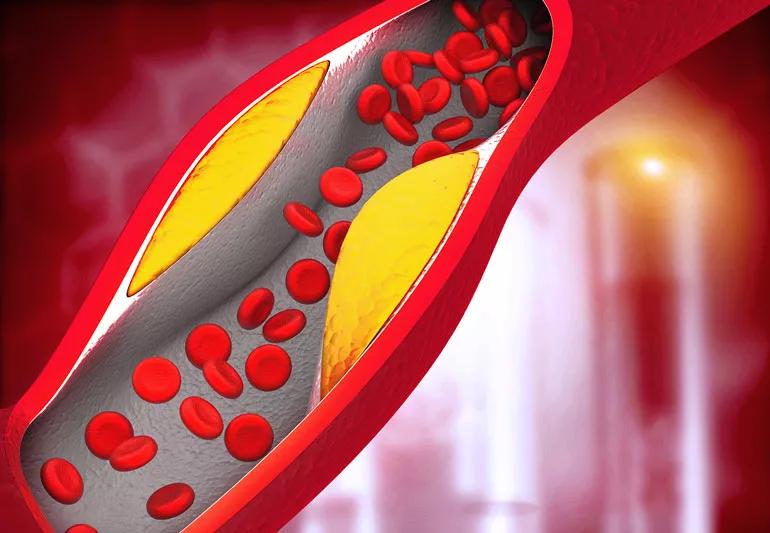Your family tree may increase your risk of high cholesterol and heart disease

Image content: This image is available to view online.
View image online (https://assets.clevelandclinic.org/transform/2049387d-82ae-4321-a501-12f6b99725e2/cholesterolTesting-1218531907-770x533-1_jpg)
Familial high cholesterol
Genetics paint the color of your eyes, assign your blood type and carve out those adorable dimples in your cheeks. But mom and dad may have passed along something else, too: high cholesterol.
Advertisement
Cleveland Clinic is a non-profit academic medical center. Advertising on our site helps support our mission. We do not endorse non-Cleveland Clinic products or services. Policy
An inherited condition known as familial hypercholesterolemia (FH) can increase your risk of heart disease at an early age. For some, that can mean their 20s.
About 1 in 250 people are born with high levels of low-density lipoprotein, or LDL (the bad kind), cholesterol. The good news? Lifestyle choices and medications can help keep your cholesterol in check if you have FH.
The key, though, is knowing you have FH. Unfortunately, an estimated 90% of people with FH lack that knowledge.
Could you be in that group? Let’s find out with interventional cardiologist Leslie Cho, MD.
For starters, don’t overthink this question. Most people don’t have genetically high cholesterol levels. “If your cholesterol is high, odds are you got it the old-fashioned way through a questionable diet, a lack of exercise and the process of aging,” notes Dr. Cho.
But FH does exist and deserves to be taken seriously. “You can have people at age 18 have a heart attack because of it,” she says.
So, what can you do to find out if you’re at an increased risk? If possible, gathering your family’s health history is the first priority. If your biological parents have FH-based high cholesterol, you might, too.
People with FH lack a specific protein — an LDL receptor — that works to get the bad cholesterol out of their blood. (A defective LDL receptor also can cause FH.) It’s a genetic condition that can be passed from generation to generation.
Advertisement
The most serious form of the condition is called homozygous familial hypercholesterolemia. This occurs when both parents have the altered DNA that causes FH and pass it along to their children.
A second type of FH, known as heterozygous familial hypercholesterolemia, is more common. This condition happens when one parent lacks the LDL receptor.
FH is more common among specific populations in Lebanon, South Africa and Lithuania, too.
The American Academy of Pediatrics recommends that all children get their first cholesterol screening between ages 9 and 11. Testing can begin as early as age 2 if risk levels are high. (Cholesterol screenings are done through what’s called a lipid panel blood test.)
“That’s just to get a baseline,” says Dr. Cho. “It helps find people who have a higher risk, so they can be monitored more closely and adjust their diet.”
Now, let’s say you’re already beyond the elementary school years. At that point, the American Heart Association and American College of Cardiology advise getting a cholesterol level screening at age 20.
If you have elevated risk factors, screenings should be done annually. Otherwise, look to get tested at least once every five years.
“I know many young people feel invincible, but it’s important to get checked,” advises Dr. Cho.
There’s a reason why so many people don’t know they have high cholesterol: The condition doesn’t announce itself in small or simple ways to let you know that it’s present, explains Dr. Cho.
Cholesterol is a waxy, fat-like substance in your blood. If there’s too much cholesterol in your blood, it tends to build up in your blood vessels. (Basically, think of it like gunk building up in a water pipe.)
Eventually, that buildup can clog your blood vessels and prevent blood from flowing to your heart or brain. That can lead to a heart attack or stroke. Without a screening, that’s how many people learn they have high cholesterol.
“That’s why it is important to get a lipid panel, and to get it done early,” stresses Dr. Cho.
There can be visible signs of FH in extreme cases. These symptoms include:
Knowing you have FH or high cholesterol is key to keeping it in check. “There are absolutely proven ways to manage high cholesterol,” says Dr. Cho. “And even if you have a significant family history, you can prevent heart disease.”
Advertisement
Cholesterol-lowering medications and a healthy diet can lower your risk of heart disease by a whopping 80%. “It’s truly amazing what can be done,” he adds.
Prescription medications known as statins can decrease LDL levels by 50% or more, which is often enough to bring high cholesterol into the normal range. Most people with FH need medications beyond just statins, though.
Filling your plate with the right foods can help control your cholesterol. The top objective is to avoid saturated fats, which are abundant in:
Interested in a diet that targets high cholesterol? Find out a registered dietitian’s recommendations and thoughts on several popular eating plans that can get you on track.
Advertisement

Sign up for our Health Essentials emails for expert guidance on nutrition, fitness, sleep, skin care and more.
Learn more about our editorial process.
Advertisement
LDL cholesterol and lipoprotein (a) cholesterol are more likely to stick to your arteries and lead to dangerous heart events
If you’re eating more than one egg per day, you might want to cut back
Understanding the difference between ‘lousy’ and ‘healthy’ cholesterol can help you keep your heart healthy
Spoiler alert: The potential benefits of drinking alcohol may be a tad overstated
An expert explains the link
The right lifestyle changes can make all the difference
Not all cholesterol-rich foods are bad for you
The short answer from a cardiologist
Type 2 diabetes isn’t inevitable with these dietary changes
Applying a hot or cold compress can help with pain
Pump up your iron intake with foods like tuna, tofu and turkey